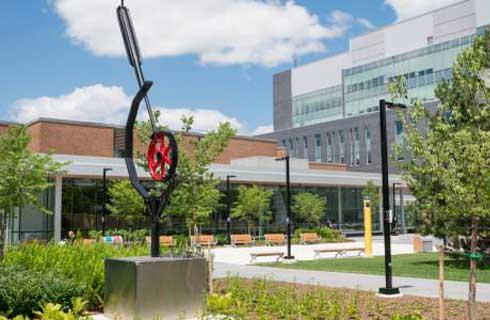MPhil / PhD / MD药理学
PhD/MPhil/MD Pharmacology

学历文凭
Ph.D.

专业院系
Institute of Translational Medicine

开学时间

课程时长

课程学费

国际学生入学条件
You’ll normally be expected to hold both:
A UK honours degree, or overseas equivalent, at 2:1 or above, in a relevant subject
A UK master’s degree, or overseas equivalent, in a relevant subject.
IDP—雅思考试联合主办方

雅思考试总分
6.5
- 雅思总分:6.5
- 托福网考总分:88
- 托福笔试总分:160
- 其他语言考试:C1 Advanced CAE requirement Overall 176 with no less than 162 in any paper
CRICOS代码:
申请截止日期: 请与IDP联系 以获取详细信息。
课程简介
Immerse yourself in research which offers the opportunity to make a significant impact on the development of medicines and their clinical use with our Pharmacology research degree. You’ll examine molecular, cellular, whole organ and patient samples, explore computational approaches to the study of drug-induced pharmacological mechanisms, and identify treatment strategies that ultimately improve patient outcomes.IntroductionThe Institute of Systems, Molecular and Integrative Biology (ISMIB) was established to integrate cutting-edge and clinical research across the Faculty of Health and Life Sciences. Programmes of work across ISMIB are varied and are led by world experts in their fields.The Department of Pharmacology and Therapeutics is a Queen’s award-winning department, internationally recognised for excellence in innovative research, with research partners across the world. We provide excellent opportunities for basic and clinical research in antimicrobial therapies, immunopharmacology, cancer pharmacology, cardiovascular pharmacology, personalised medicines, long-acting therapies, complex medicines and nanotherapeutics. Drug safety and date science are key themes across our research activity.We offer state-of-the-art research facilities and have funding from sources including the Medical Research Council (MRC), Biotechnology and Biological Sciences Research Council (BBSRC), Wellcome Trust, National Institute for Health and Care Research (NIHR), Wolfson Foundation and the EU.Research topicsWe welcome research proposals around the following themes:The biological effects of therapeutics in humansNon-human or non-clinical studies conducted with the intent to advance therapies to the clinic or develop principles for the application of therapeutics to human diseaseInvestigations in humans which define the biology of disease and provide the scientific foundation for the development of new or improved therapies for human diseaseThe biology-chemistry “bridge”Drug safety sciencePersonalised medicineImmunopharmacologyThe pharmacology of infectious diseaseComplex medicines and long-acting therapeuticsBiomaterialsNeuropharmacology.
相关申请
 预科
预科 奖学金
奖学金 实习机会
实习机会 在校学习
在校学习 跨境学习
跨境学习 校园授课-线上开始
校园授课-线上开始 在线/远程学习
在线/远程学习
开学时间&学费
学费信息仅供参考,请与IDP联系以获取详细信息
| 开学时间 | 时长 | 学费 | 地点 |
|---|
学校排名

世界排名181
数据源:
泰晤士高等教育世界大学排名
关于利物浦大学

利物浦大学成立于 1881 年,是英国最早的 "红砖 ''大学,也是著名的罗素集团的创始成员之一,拥有九位诺贝尔奖获得者齐名。利物浦大学拥有近 32500 名学生,其中包括来自 187 多个国家的 7900 名国际学生,是一个多元化、热情友好的生活和学习场所。最先进的一流设施和出色的学生支持确保利物浦大学稳居英国大学20强(在《2026年泰晤士报和星期日泰晤士报优秀大学指南》中名列第18位)、全球大学150强之列(2026年QS世界排名)。该校在 "卓越研究框架"(REF 2021)中巩固了其世界领先研究机构的地位,该校 91% 的研究被评为世界领先或国际优秀。对学生来说,这意味着,在利物浦大学能够由一流的专家为其提供出色的教学,2023年英国政府卓越教学框架(Teaching Excellence Framework)授予该校的最高评级''黄金级''就是最有力的支持和证明。只有7所罗素集团大学因提供最优质的教学而荣获''黄金''评级,利物浦大学就是其中之一。利物浦大学是一所校园大学,坐落在充满活力的城市中心地带,拥有各种设施,其中包括一流的学生宿舍、图书馆、体育中心和学生会,这些都距离不远,步行很快即可到达。利物浦这座城市是披头士乐队、利物浦和埃弗顿足球俱乐部的家乡,除此之外,那里还有丰富的文化等待学生去探索。利物浦真的是一座无与伦比的城市,除伦敦以外,这里拥有英国最多的画廊和博物馆,还有各种各样的餐馆、酒吧和商店,可以满足各种预算和口味需求。此外,如果学生想乘坐火车去其他城市游览,只需2小时20分钟左右即可到达伦敦,36分钟可到达曼彻斯特。
本校相关课程

理学硕士城市再生与管理
学历文凭
Masters Degree (Taught)
开学日期
课程费用总额


马镇和区域规划
学历文凭
Masters Degree (Taught)
开学日期
课程费用总额


M / CD城镇与区域规划
学历文凭
Masters Degree (Taught)
开学日期
课程费用总额


硕士 历史-20世纪历史
学历文凭
Masters Degree (Taught)
开学日期
课程费用总额


MSc / PGDip / PGCert心理学研究方法
学历文凭
Masters Degree (Taught)
开学日期
课程费用总额


理学硕士放射计量学-仪器和建模
学历文凭
Masters Degree (Taught)
开学日期
课程费用总额

其他相关课程

MSc Biotechnology
 林肯大学
林肯大学泰晤士高等教育世界大学排名:771
学历文凭
Masters Degree (Taught)
开学日期
课程费用总额


法学和分析科学(荣誉)理学士学位
 哈德斯菲尔德大学
哈德斯菲尔德大学泰晤士高等教育世界大学排名:575
学历文凭
Bachelor Degree with Honours
开学日期
课程费用总额


理学研究生文凭-植物生物技术
 奥塔哥大学
奥塔哥大学学历文凭
Postgraduate Diploma
开学日期
课程费用总额


医学科学(荣誉学位)学士学位-地理
 悉尼大学
悉尼大学泰晤士高等教育世界大学排名:54
学历文凭
Bachelor Degree with Honours
开学日期
课程费用总额


理学研究生证书-未声明-SCI
 昆士兰大学
昆士兰大学泰晤士高等教育世界大学排名:80
学历文凭
Graduate Certificate
开学日期
课程费用总额


Bachelor of Science in Biotechnology
 乐卓博大学
乐卓博大学泰晤士高等教育世界大学排名:267
学历文凭
Bachelor Degree
开学日期
课程费用总额










